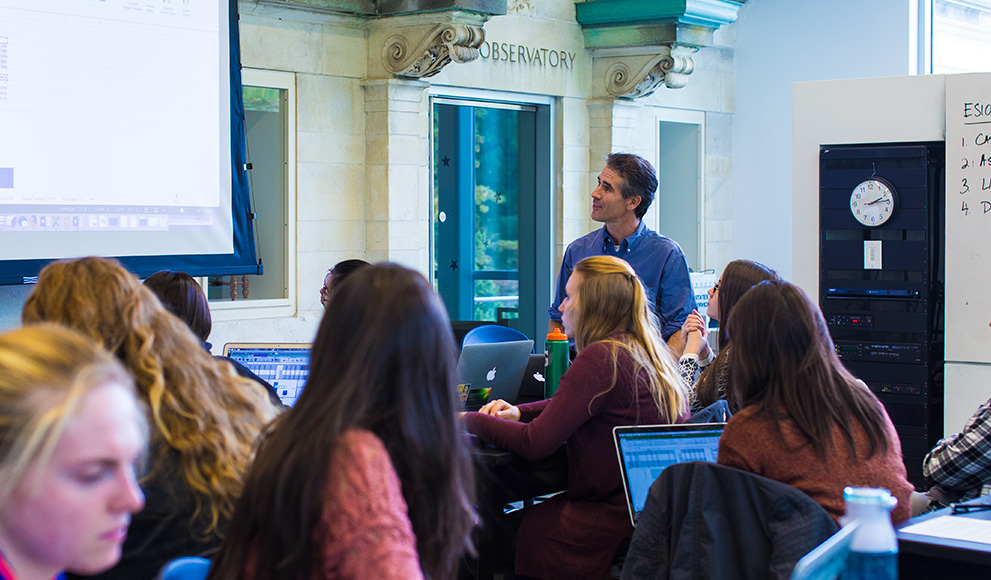Environmental Studies Course Combines Online Learning and Cross-Campus Collaboration

"Over the past few years, Wellesley has been experimenting with different ways to take what we do so well here and move it into the world of online education," said Jay Turner, associate professor of environmental studies. Last summer, Turner proposed and developed an interdisciplinary, team-taught course with Fuji Lozada, professor of anthropology and environmental studies at Davidson College in North Carolina.
Their course, Food, Agriculture, and Sustainability (ES 103), is supported by a planning grant from the Mellon Foundation and explores ways that Wellesley and Davidson can collaborate on blended learning in the liberal arts. Students at the two colleges work together online as they consider where our food comes from and if current methods of growth, distribution, and consumption are sustainable.
As the syllabus explains, students investigate those questions using a variety of online tools and offline projects, including community-based learning projects, hands-on agricultural research, and the development of a case study on a policy-related food issue. Both groups read the same material, watch instructional videos produced by the two professors, and post weekly reflections on course material and projects on a shared edX site. "Our goal is to build connections and comparisons that wouldn't be possible if not for the cross-campus collaboration," said Turner.
The team-taught approach begins that process by introducing students to two complementary perspectives. "I'm a historian who focuses on the environmental policy and science in the U.S., and Fuji is a cultural anthropologist who focuses on China," Turner said. "Together, we strengthen the course's interdisciplinary approach to environmental studies, and help students to integrate the scientific, cultural, and economic dimensions of environmental problems."
Each college brings unique strengths to the partnership. "Davidson has a tradition of community-based learning, and Fuji's class had always included a community-based learning component, where students partnered with farmers markets or food justice groups and did projects that were educational for students and useful for the community. It is exciting to have my students doing that as well," said Turner of the first joint project.
This semester, one group of Wellesley students is working with food pantries in Natick and Framingham to promote food rescue and food access in those communities. Another group is working with the town of Natick to develop public outreach materials for a new curbside residential composting program. The third group of Wellesley students is surveying visitors to the Natick Farmers Market. "All of these projects offer opportunities to make connections between the big concepts and issues raised in the course with the work of local community organizations," said Turner.
The second Wellesley-Davidson joint project builds on research at Wellesley about the methods used to grow food. Since 2013, students in ES 103 and other courses have been analyzing the impact of conventional and organic farming on 20 boxes of carrots and spinach that they’ve cultivated. Although Davidson hoped to replicate Wellesley’s plot, conditions didn’t cooperate, so students from both schools are analyzing the Wellesley data. "There are many competing claims about the performance of different agricultural systems," said Turner. "The farm-in-a-box gives students the chance to test some of those claims themselves on a small scale."
For their final project, the students will collaborate on a case study on one of four topics: fish and aquaculture, feeding kids, the future of food (which could include synthetic meat), and comparative food politics between the United States and Europe. Each topic will be researched by four Wellesley students and eight Davidson students, who will communicate via Skype, Google hangouts, or text messaging as they decide how to divide the work. The end product for the groups will be a Web page highlighting their approach and findings.
"Environmental studies raises as many economic and policy questions as scientific issues," said Turner. "That’s why we must approach the subject in an integrated way that works across the disciplines."
The course's online components help students do just that by exposing them to various viewpoints on the course's website and on the edX page where students share and compare ideas. Those sources help shape class discussions, as does the ongoing dialogue the students, Turner, and Lozada engage in on the edX platform.
"Despite not having face-to-face connections, both Davidson and Wellesley students seem to be engaging each other in constructive and reflective ways," Lozada said. "I think having a shared curriculum—readings and activities—has allowed students to better interact with each other online."
Cathy Ye '18 concurred. "There is a lot of valuable discussion in class, and I always gain new perspectives into the topics," she said. "The online forum has made it especially useful in reflecting and digesting course readings and then forming my own opinion on the topic."
Turner said, "Wellesley students have been really excited to find out how things might be perceived by their fellow students at Davidson. They want to know what their peers think, what their perspectives are. They want to make connections."
